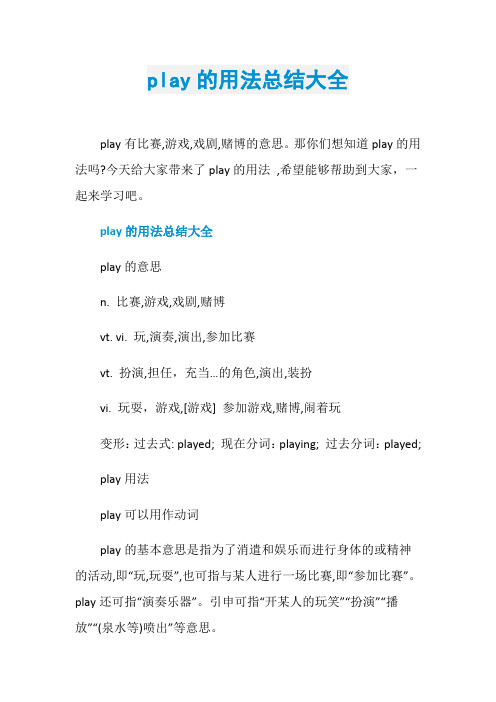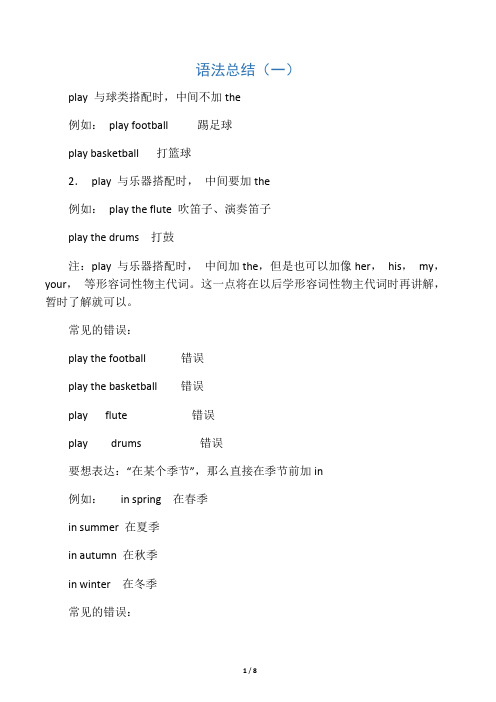play~do~go用法辨析
play的用法讲解

play的用法讲解一、play的基本含义与用法play作为一个常见的英语动词,有多种不同的含义和用法。
在不同的上下文中,play可以表示玩耍、扮演角色、播放音乐等。
下面将对这些不同含义和用法进行详细讲解。
1. 玩耍的意义play最基本的含义是“玩耍”,它可以用来描述儿童或者成年人参与各种游戏、体育活动或娱乐活动。
例如:“Kids love to play in the park.”(孩子们喜欢在公园里玩耍)。
在这个意义上,play通常与一些特定的名词搭配使用,如game, sport,pool等。
2. 扮演角色另外,play还可以表示“扮演角色”。
这时候,它通常与名词actor或者character 连用。
例如:“He played Hamlet in the famous theater production.”(他在著名剧院制作中饰演了哈姆雷特)。
在这种情况下,play可以指表演戏剧、电影或者舞台剧等。
3. 播放音乐此外,play还可指代播放音乐。
当我们想听音乐时,我们会说:“Can you play some music?”(你能播放一些音乐吗?)。
在这里,play的意思是“播放”或“演奏”。
二、play作为名词的用法除了作为动词,play还可以用作名词。
在这种情况下,play指的是戏剧、电影或者音乐等节目的表演。
例如:“The play received rave reviews from the critics.”(这部戏得到评论家们的好评)。
在这个意义上,play通常与冠词“the”连用,并表示某一特定的表演。
三、play短语和固定搭配除了基本含义和用法外,我们还需要掌握一些与play相关的短语和固定搭配。
以下列举几个常见的例子:1. play a role/part:扮演角色例如:“She played a central role in the success of the project.”(她对于项目成功发挥了重要作用)2. play by ear:即兴表演例如:“The band didn't have a setlist, they just decided to play by ear.”(乐队没有准备曲目单,他们只是随机进行即兴表演)3. play it safe:保守行事例如:“He decided to play it safe and not take any unnecessary risks.”(他决定采取保守策略,不冒任何不必要的风险)4. fair play:公平竞争例如:“The referee ensured that both teams played with fair play.”(裁判确保双方队伍公平竞争)四、play的其他扩展用法除了上述基本用法和短语,play还有一些其他的扩展用法,例如:1. play with fire:冒险尝试危险之事例如:“You're playing with fire if you keep provoking him.”(如果你继续挑衅他,你就是作死)2. play a trick/prank on someone:给某人搞恶作剧例如:“They played a trick on their classmate by hiding his backpack.”(他们给他们的同学恶作剧,把他的背包藏起来了)3. play a video game:玩电子游戏例如:“I like to play video games in my free time.”(我喜欢在空闲时间玩电子游戏)总结:在不同的语境中,play可表示玩耍、扮演角色或者演奏音乐等。
go和do与运动项目的搭配使用

Unit22 sport动词play, go和do与运动项目的搭配使用动词play, go和do都可以与表示运动项目的词汇搭配使用,表示从事某项体育活动。
使用时,各自与不同的词语构成固定搭配,需要加以区分。
play一般与球类运动搭配使用,例如:You play football.He plays ice hockey.They play snooker(台球).play也常与game搭配使用。
game可以用来指球类运动,例如:a game of golf;也可以泛指一切游戏类活动,如cards(纸牌),chess(国际象棋),mah-jong(麻将)等。
Which game do you play? 你们玩什么游戏?They are playing a game of draughts(国际象棋).go与涉及身体移动的体育活动搭配使用,通常为go + doing的形式,例如:We go running / jogging / swimming / rowing(划船)询问他人参加何种体育运动用动词do,如:Which sports do you do? 你平时参加什么运动?与do搭配使用的还有下面这些运动:do gymnastics / Tai Chi(太极拳) / Kung Fu(中国武术) / karate(空手道) /aerobics /athletics (田径运动)等。
I do Kung Fu every Friday.I do the high jump(跳高)millions of peoplehundreds of peoplethousands of people作定语表示具体的数目时一律不用复数作名词时,后面跟of表示不确定的数目时用复数There are hundreds of people in the hall.There are five hundred workers at the factory.be able to能做…后面接动词的原形“能够……”They aren’t able to help you today.By the time he finishes his courses, he will be able to speak English very well.形容词的最高级:1.表示“最…之一”的句式China is one of the oldest countries in the world.He was one of my best friends in my childhood.Paris is among the greatest cities in the world.2.最高级前可以有状语或定语The Yellow River is the second longest river in China.Asia is by far the largest continent in the world.3.最高级前有物主代词或名词所有格时不加定冠词theFriday is my busiest day.John is Jim’s best friend.动词+ v-ing 结构英语中有些动词后面可以接动词的- ing 形式,如我们已经的to like和to love,其他常用的动词还有:stop doing sth.停止做某事stop to do sth.停下来去做某事He stopped smoking.He stopped to smoke a cigarette.He’ll leave London.He’ll leave to/for London.They stopped playing when it rained. 下雨时他们停止了玩耍。
go do have play的用法

"go", "do", "have", "play" 都是英语词汇,它们的具体用法如下:1. "go":这个单词通常用来表示进行某种活动,例如"go to school"(去上学),"go to the movies"(去看电影),"go for a walk"(去散步)。
它也可以用来描述将来的动作,例如"I'm going to the store"(我要去商店)。
2. "do":这个单词是一个助动词,通常用来构成一般现在时态的疑问句和否定句。
例如,"Do you speak English?"(你会说英语吗?),"I don't like music"(我不喜欢音乐)。
3. "have":这个单词通常用来表示拥有或进行某种活动。
例如,"I have a book"(我有一本书),"I have lunch at noon"(我在中午吃午饭)。
它也可以用来描述已经完成的动作,例如"I have finished my homework"(我已经完成了我的作业)。
4. "play":这个单词通常用来表示进行某种游戏或活动。
例如,"play football"(踢足球),"play chess"(下棋),"play the guitar"(弹吉他)。
它也可以用来表示进行某种角色扮演或扮演某种角色,例如"play the part of a doctor"(扮演医生的角色)。
play playing plays的用法

play playing plays的用法play playing plays的用法"Play", "playing"和"plays"是英语中常见的动词形式,它们都可以表示玩耍、演奏、扮演等意思。
下面是它们的详细用法:1. Play (动词):表示进行游戏或娱乐活动,也可以表示进行音乐表演或戏剧表演。
例如:- I like to play basketball with my friends on the weekends.- She plays the piano beautifully.- They are going to perform a play at the theater tonight.2. Playing (现在分词):表示正在进行某项活动,通常与be动词连用。
例如:- The children are playing in the park.- He is playing video games in his room.- She was playing tennis when it started to rain.3. Plays (第三人称单数):表示某人或某物正在进行游戏、音乐表演或戏剧表演等活动。
例如:- John always plays soccer on Saturdays.- The band plays rock music at the club every Friday night.- The actress who plays Juliet is very talented.需要注意的是,这三个形式都可以有不同的时态和语态变化,具体要根据上下文来判断。
总之,"play", "playing"和"plays"是非常常见且重要的英语单词,在日常生活中用得很多。
play的用法总结大全

play的用法总结大全play有比赛,游戏,戏剧,赌博的意思。
那你们想知道play的用法吗?今天给大家带来了play的用法,希望能够帮助到大家,一起来学习吧。
play的用法总结大全play的意思n. 比赛,游戏,戏剧,赌博vt. vi. 玩,演奏,演出,参加比赛vt. 扮演,担任,充当…的角色,演出,装扮vi. 玩耍,游戏,[游戏] 参加游戏,赌博,闹着玩变形:过去式: played; 现在分词:playing; 过去分词:played;play用法play可以用作动词play的基本意思是指为了消遣和娱乐而进行身体的或精神的活动,即“玩,玩耍”,也可指与某人进行一场比赛,即“参加比赛”。
play还可指“演奏乐器”。
引申可指“开某人的玩笑”“扮演”“播放”“(泉水等)喷出”等意思。
play可用作及物动词,也可用作不及物动词。
用作及物动词时接表示球或乐器等名词、代词或that从句作宾语。
有时还可接双宾语,其间接宾语可转化成介词to或for的宾语,还可接由“(as+) n./adj. ”充当补足语的复合宾语。
可用于被动结构。
play还可用作系动词,后接形容词或名词作表语。
当play后接名词用于演出中作“扮演”解时,一般析为及物动词; 作“假装…玩”解时,常析为系动词。
play用作动词的用法例句Once he is free, he will play computer games.只要他有空,他就玩电脑游戏。
The boy rushed his homework through and went out to play.那男孩急急忙忙把作业做好,出外玩去了。
On Saturday France plays Rugby against Wales.星期六,法国队和威尔士队比赛橄榄球。
play可以用作名词play用作名词时意思是“游戏,玩耍”,指儿童用以玩乐而进行的各项活动。
play也可指各种体育项目,即“比赛,竞赛,运动”,既可表示一次具体的“比赛”,也可表示在比赛中的“表现或作风”或“比赛中的动作或技巧”。
小学二年级上学期英语语法总结

语法总结(一)play 与球类搭配时,中间不加the例如:play football 踢足球play basketball 打篮球2.play 与乐器搭配时,中间要加the例如:play the flute 吹笛子、演奏笛子play the drums 打鼓注:play 与乐器搭配时,中间加the,但是也可以加像her,his,my,your,等形容词性物主代词。
这一点将在以后学形容词性物主代词时再讲解,暂时了解就可以。
常见的错误:play the football 错误play the basketball 错误play flute 错误play drums 错误要想表达:“在某个季节”,那么直接在季节前加in例如:in spring 在春季in summer 在夏季in autumn 在秋季in winter 在冬季常见的错误:in the summer (错误)at winter (错误)at the spring (错误)on autumn (错误)要想表达:“在早、中、晚”,那么用in the 再加上早中晚例如:in the morning 在早晨、在上午in the afternoon 在中午、在下午in the evening 在晚上常见的错误:in morning (错误)at afternoon (错误)in evening (错误)注:night 特殊,要用at例如:at night 在晚上在几点钟前面要用at,无论是整点、半点、还是几点几分,都在时间前直接加at。
例如:at five o’clock 在五点at half past eleven 在十一点半at twelve ten 在十二点十分常见的错误:at the five o’clock 错误in half past ten 错误on the ten o’clock 错误在城市、国家等大地点前面直接加in,并且城市、国家的首字母需要大写。
go的用法意思及例句参考
go的用法意思及例句参考go有去;离开;变得;进行等意思,go的用法有很多你都了解吗,下面跟着店铺一起来学习关于go的用法及例句吧,希望对大家的学习有所帮助!go的用法go的用法1:go的基本意思是“离开原来的地方向别处挪动”。
引申可表示“去,走,旅行,前进”“离开,离去”“死,垮,坏”“放弃,消失,停止存在”“处于…状态”“流行,流传,流通”“发生,进展,变成,变为”“运行,运转,起作用,走动”“遵照…行动”“放置,装入,纳入”“响,发音,报钟点”“流逝,消逝,走过,经过”“归,落入…手”“诸”“总共,合成”“通到,延伸至”“花费”“卖,卖得…价”“有节奏,与曲调相配”“称为,叫做,冒名”“有,备有”“招惹”等意思。
go的用法2:go用作不及物动词时,常可接带to的动词不定式,这动词不定式并不是用作状语表示目的,而是与go构成一个动词短语,意思是“去做某事”,在非正式英语中,这种结构常可变为go and do sth,而在美式英语中and常被省去。
go的用法3:go常用于“be going to+动词原形”结构,可以用于表示时间,即“将要做某事”;也可以用于表示意志,即“打算做某事”“准备做某事”。
表示“将要做某事”的用法在美式英语中使用得很广泛,大有取代英式英语中的shall〔will〕之势。
表示“打算做某事”“准备做某事”时多用于人称结构,用于被动语态时则可用于非人称结构,表示情况的必然或或然等。
用于一般过去时态,be going to 所表示的意图往往是未达到的。
I was going to see you yesterday, but it rained. 我本本打算昨天去看你,可是下雨了。
; 也可为非人称代词it,用于自然现象。
go的用法4:“be going to”后有时也可接名词(多表示地点),这时to是介词。
现代英语中也可用“be going to go to”,两者意思相同,都表示“去某地”,但后者使用不太广泛。
play~do~go用法辨析word版本
p l a y~d o~g o用法辨析play ~ do ~ goIn English, we use three different verbs to talk about sports:play ~ do ~ go1) Use PLAY for team sports or sports played with a ball: footballbaseballbasketballrugbytennishockeyvolleyballcricketsoccerbadmintongolfI love to play badminton.I played basketball when I was in high school.In my spare time, I play soccer with my friends.Do you play any sports?When I was a kid, I loved playing baseball with my family.2) Use GO for sports that end in –ing (gerunds):skiingswimmingclimbingdivingfishingrunningjoggingskating / figure skatingI love to go jogging in the morning before I go to work.My grandfather and I go fishing every time I visit him.Every winter, my family and I go skiing in the Rockies.What are you doing this weekend? Let’s go swimming!*NOTE: There is NO to between go and the activity. You do NOT ‘go to swimming.’ You just ‘go swimming.’The sports that end in –ing are all in gerund form. They can also be used in their verb form:skiswimclimbdive / scuba divefishrunjogskate / figure skateDo you scuba dive? Yes! I love scuba diving.I learned how to ski when I was 9 years old.She skates at the local community centre.He runs marathons for fun!EXCEPTIONS!There’s always an exception to the rule in English! These sports are not used with go:boxingfencingweight trainingDon’t use a verb with these sports. They don’t fit easily into any of the three categories. Don’t say “I do boxing” or “I go fencing.” You can say,I like to box.I like watching fencing at the Olympics.Sometimes we use these sports with do some,I’m going to the gym to do some weight training.3) Use DO with sports that you don’t need any equipment to do:(可以不借助于器械)aerobicskarate / martial artsyogagymnasticsShe does a lot of yoga – that’s why she looks so great!My daughter used to take swimming lessons, but now she does gymnastics. Do you do any sports?To stay in shape, I jog every morning, I play tennis and I also do aerobics.~。
go的搭配及用法
∙go∙v. [gəʊ]( goes; went, gone; going )∙∙双解释义∙vi. 1.去; 走; 行; 驶 move; pass from one point to another and away from the speaker, etc.∙vi. 2.进行,运行,运转 happen in a certain way; revolve; operate∙vi. 3.放,置 put; place; lay∙vi. 4.伸展,通往 extend; get through∙vi. 5.消失,丢失 die away; lose∙vi. 6.垮下来,死 decline; break down; die∙vi. 7.花费,销售 cost; spend; sail∙vi. 8.行,有效 effective; valid∙vi. 9.发出…声音,响 make out sound∙vi. 10.时间)过去 (time) pass by∙vi. 11.据说,流传 be stated, said in a certain way∙vi. 12.变得,成为,处于…状态 act so as to come into a certain state or condition∙基本要点∙1.go的基本意思是“离开原来的地方向别处挪动”。
引申可表示“去,走,旅行,前进”“离开,离去”“死,垮,坏”“放弃,消失,停止存在”“处于…状态”“流行,流传,流通”“发生,进展,变成,变为”“运行,运转,起作用,走动”“遵照…行动”“放置,装入,纳入”“响,发音,报钟点”“流逝,消逝,走过,经过”“归,落入…手”“诸”“总共,合成”“通到,延伸至”“花费”“卖,卖得…价”“有节奏,与曲调相配”“称为,叫做,冒名”“有,备有”“招惹”等意思。
2.go用作不及物动词时,常可接带to的动词不定式,这动词不定式并不是用作状语表示目的,而是与go构成一个动词短语,意思是“去做某事”,在非正式英语中,这种结构常可变为go and do sth,而在美式英语中and常被省去。
初中英语英语实义动词用法辨析
初中英语英语实义动词用法辨析实义动词是表示动作的词,它有完整的词汇和语法,可以表达各种不同的动作和状态。
在初中英语中,实义动词是非常重要的一部分,因为它涉及到句子的基本结构。
本文将详细介绍初中英语中实义动词的用法,帮助同学们更好地理解和掌握这些动词。
一、实义动词分类实义动词可以分为及物动词和不及物动词(也称为“中性动词”或“单宾动词”)。
及物动词需要一个或多个宾语才能完整表达意思,而不及物动词本身就可以表达完整的意思,不需要宾语。
此外,实义动词还有系动词和非系动词的分类。
二、常用实义动词用法辨析1. 动词“be”“Be”是一个系动词,它有“am/is/are”等不同的形式,可以表达不同的时态和语态。
例如,“am/is”表示现在时,“are”表示现在进行时或过去时。
在使用“be”时,需要注意主语的人称和数的变化。
2. 动词“have”“Have”是一个及物动词,表示拥有或具有某物。
在使用时,需要注意主语的人称和数的变化以及与助动词“do”的搭配使用。
3. 动词“do”“Do”是一个常用的及物动词,它可以表示做某事、行动、尝试等意思。
在使用时,需要注意时态的变化,例如“do”有原形、第三人称单数、过去式等不同的形式。
4. 动词“play”“Play”是一个常用的及物动词,表示玩耍、演奏乐器等意思。
在使用时需要注意人称和数的变化,以及与其他介词的搭配使用。
5. 动词“go”“Go”是一个常用的及物动词,表示前往某地、行动、做某事等意思。
在使用时需要注意与时间副词(如“to”、“on”)的搭配使用。
6. 其他常用实义动词除了上述常用实义动词外,还有许多其他的常用实义动词可以表达不同的动作和状态。
例如,“come”、“go”、“get”、“make”、“take”、“find”、“eat”、“drink”、“make”、“buy”、“put”、“go”、“like”、“love”、“hate”、“forget”、“remember”、“try”等。
- 1、下载文档前请自行甄别文档内容的完整性,平台不提供额外的编辑、内容补充、找答案等附加服务。
- 2、"仅部分预览"的文档,不可在线预览部分如存在完整性等问题,可反馈申请退款(可完整预览的文档不适用该条件!)。
- 3、如文档侵犯您的权益,请联系客服反馈,我们会尽快为您处理(人工客服工作时间:9:00-18:30)。
play ~ do ~ go
In English, we use three different verbs to talk about sports:
play ~ do ~ go
1) Use PLAY for team sports or sports played with a ball:
football
baseball
basketball
rugby
tennis
hockey
volleyball
cricket
soccer
badminton
golf
I love to play badminton.
I played basketball when I was in high school.
In my spare time, I play soccer with my friends.
Do you play any sports?
When I was a kid, I loved playing baseball with my family.
2) Use GO for sports that end in –ing (gerunds):
skiing
swimming
climbing
diving
fishing
running
jogging
skating / figure skating
I love to go jogging in the morning before I go to work.
My grandfather and I go fishing every time I visit him.
Every winter, my family and I go skiing in the Rockies.
What are you doing this weekend? Let’s go swimming!
*NOTE: There is NO to between go and the activity. You do NOT ‘go to swimming.’ You just ‘go swimming.’
The sports that end in –ing are all in gerund form. They can also be used in their verb form:
ski
swim
climb
dive / scuba dive
fish
run
jog
skate / figure skate
Do you scuba dive? Yes! I love scuba diving.
I learned how to ski when I was 9 years old.
She skates at the local community centre.
He runs marathons for fun!
EXCEPTIONS!
There’s always an exception to the rule in English! These sports are not used with go:
boxing
fencing
weight training
Don’t use a verb with these sports. They don’t fit easily into any of the three categories. Don’t say “I do boxing” or “I go fencing.” You can say,
I like to box.
I like watching fencing at the Olympics.
Sometimes we use these sports with do some,
I’m going to the gym to do some weight training.
3) Use DO with sports that you don’t need any equipment to do:(可以不借助于器械)
aerobics
karate / martial arts
yoga
gymnastics
She does a lot of yoga – that’s why she looks so great!
My daughter used to take swimming lessons, but now she does gymnastics.
Do you do any sports?
To stay in shape, I jog every morning, I play tennis and I also do aerobics.
~。
